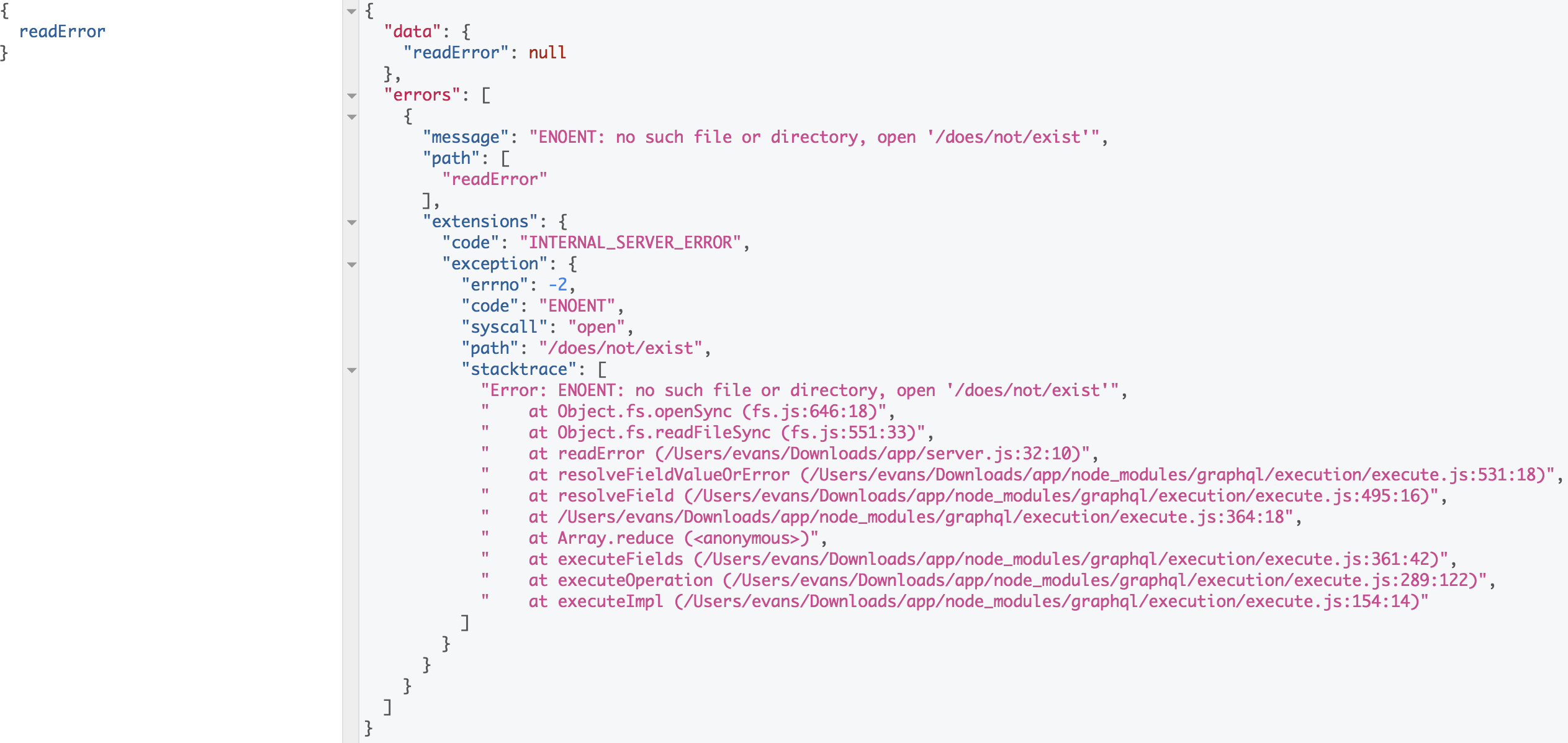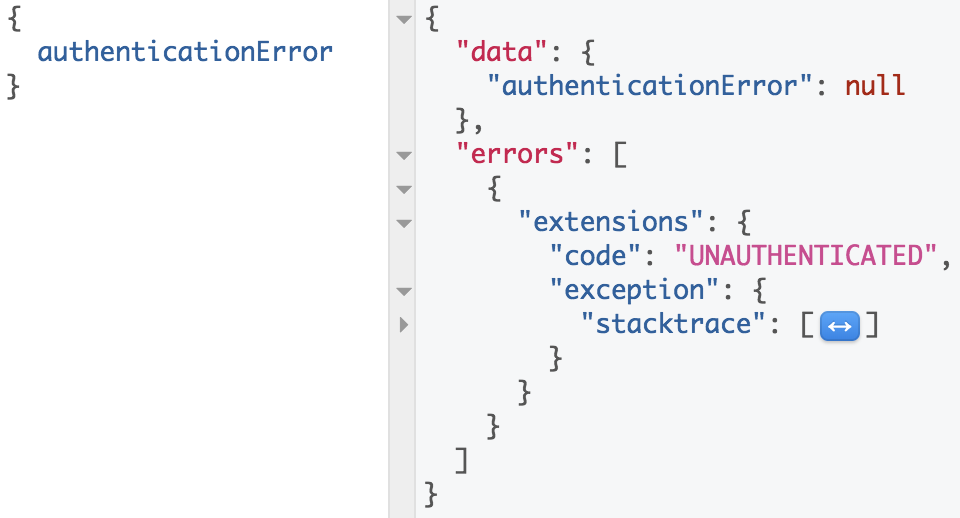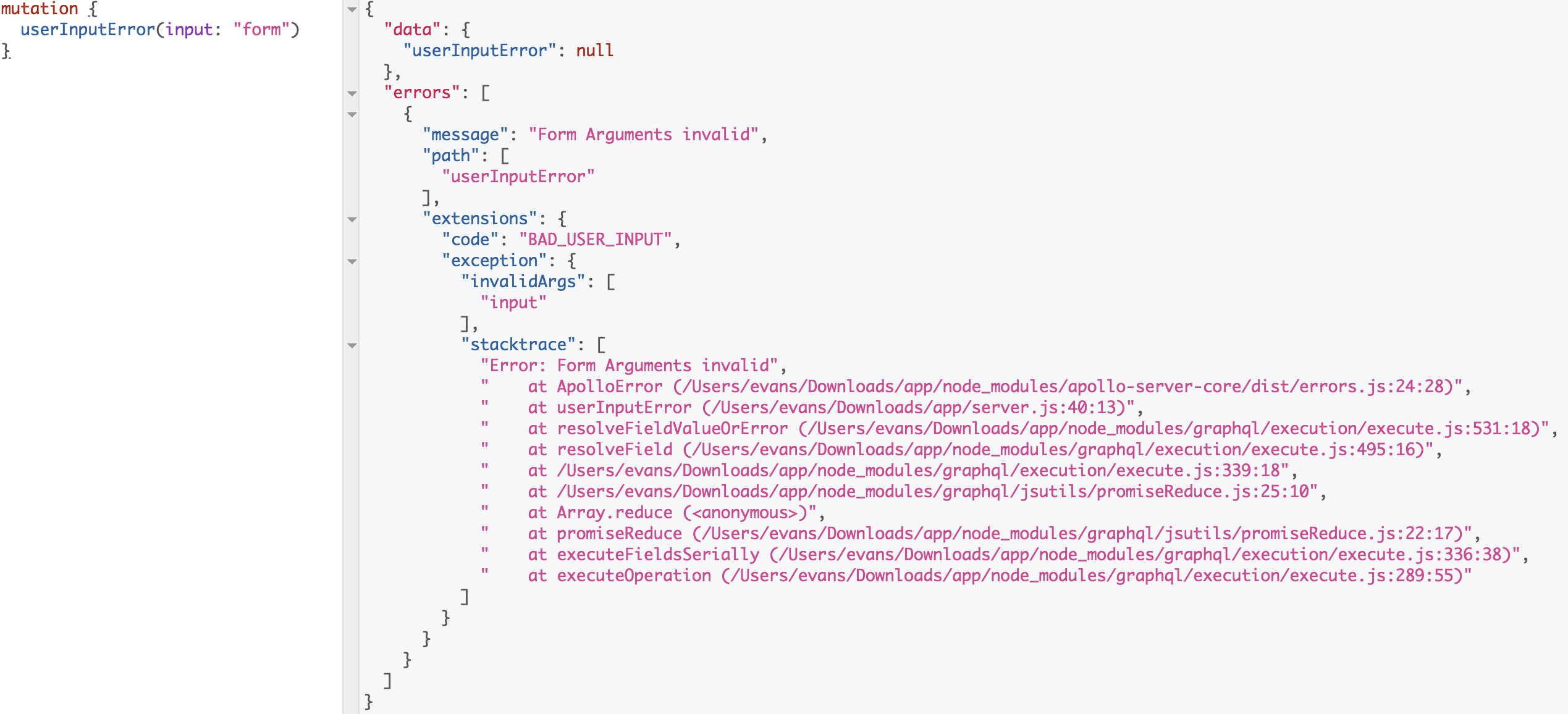Error handling
Making errors actionable on the client and server
Apollo Server provides a collection of predefined errors, including
AuthenticationError, ForbiddenError, UserInputError, and a generic
ApolloError. These errors are designed to enhance errors thrown before and during GraphQL execution, making it easier to debug your Apollo Server integration and enabling clients to take specific actions based on an error.
When an error occurs in Apollo Server both inside and outside of resolvers, each error inside of the errors array contains an extensions object that contains the information added by Apollo Server.
Default information
The first step to improving the usability of a server is providing the error stack trace by default. The following example demonstrates the response returned from Apollo Server with a resolver that throws a node SystemError.
const {
ApolloServer,
gql,
} = require('apollo-server');
const typeDefs = gql`
type Query {
readError: String
}
`;
const resolvers = {
Query: {
readError: (parent, args, context) => { fs.readFileSync('/does/not/exist'); }, },
};The response will return:

To disable stacktraces for production, pass
debug: falseto the Apollo Server constructor or set theNODE_ENVenvironment variable to 'production' or 'test'. Note that this will make the stacktrace unavailable to your application. If you want to log the stacktrace, but not send it in the response to the client, see Masking and logging errors below.
Codes
In addition to stacktraces, Apollo Server's exported errors specify a human-readable string in the code field of extensions that enables the client to perform corrective actions. In addition to improving the client experience, the code field allows the server to categorize errors. For example, an AuthenticationError sets the code to UNAUTHENTICATED, which enables the client to reauthenticate and would generally be ignored as a server anomaly.
const {
ApolloServer,
gql,
AuthenticationError,} = require('apollo-server');
const typeDefs = gql`
type Query {
authenticationError: String
}
`;
const resolvers = {
Query: {
authenticationError: (parent, args, context) => { throw new AuthenticationError('must authenticate'); }, },
};The response will return:

Augmenting error details
When clients provide bad input, you may want to return additional information
like a localized message for each field or argument that was invalid. The
following example demonstrates how you can use UserInputError to augment
your error messages with additional details.
const {
ApolloServer,
UserInputError,
gql,
} = require('apollo-server');
const typeDefs = gql`
type Mutation {
userInputError(input: String): String
}
`;
const resolvers = {
Mutation: {
userInputError: (parent, args, context, info) => { if (args.input !== 'expected') { throw new UserInputError('Form Arguments invalid', { invalidArgs: Object.keys(args), }); } }, },
};The response will return:

Other errors
If you need to define other error codes that are specific to your
application, you can use the base ApolloError class.
new ApolloError(message, code, additionalProperties);Masking and logging errors
For the client response
The Apollo Server constructor accepts a formatError function that is run on each error passed back to the client. This can be used to mask errors as well as for logging.
Note that while this changes the error which is sent to the client, it doesn't change the error that is sent to Apollo Graph Manager. See the
rewriteErrorfunction in the For Apollo Graph Manager reporting section below if this behavior is desired.
This example demonstrates throwing a different error when the error's message starts with Database Error::
const server = new ApolloServer({
typeDefs,
resolvers,
formatError: (err) => { // Don't give the specific errors to the client. if (err.message.startsWith("Database Error: ")) { return new Error('Internal server error'); } // Otherwise return the original error. The error can also // be manipulated in other ways, so long as it's returned.
return err;
},
});
server.listen().then(({ url }) => {
console.log(`🚀 Server ready at ${url}`);
});The error instance received by formatError (a GraphQLError) contains an originalError property which represents the original error thrown within the resolver. This can be used to instanceof check against a specific error class, such as AuthenticationError, ValidationError, etc.:
/* ... */
formatError(err) {
if (err.originalError instanceof AuthenticationError) {
return new Error('Different authentication error message!');
}
},
/* ... */To make context-specific adjustments to the error received by
formatError(e.g. localization or personalization), consider using thedidEncounterErrorslifecycle hook to attach additional properties to the error, which can be accessed and utilized withinformatError.
For Apollo Graph Manager reporting
You can use Apollo Graph Manager to analyze error rates instead of simply logging errors to the console. If you connect Apollo Server to Graph Manager, all errors are sent to Graph Manager by default. If you don't want certain error information to be sent to Graph Manager (either because the error is unimportant or because certain information is confidential), you can modify or redact errors entirely before they're transmitted.
To account for these needs, a rewriteError function can be provided within
the engine settings to Apollo Server. At a high-level, the function will
receive the error to be reported (i.e., a GraphQLError or an ApolloError)
as the first argument. The function should then return a modified form of
that error (e.g., after changing the err.message to remove potentially
sensitive information), or should return an explicit null in order to avoid
reporting the error entirely.
The following sections give some examples of various use-cases for rewriteError.
Avoid reporting lower-severity, predefined errors
If an application is using the predefined errors noted above (AuthenticationError, ForbiddenError, UserInputError, etc.), these can
be used with rewriteError.
For example, if the current server is throwing the AuthenticationError
when a mis-typed password is supplied, an implementor can avoid reporting
this to Apollo Graph Manager by defining rewriteError as follows:
const { ApolloServer, AuthenticationError } = require("apollo-server");
const server = new ApolloServer({
typeDefs,
resolvers,
engine: { rewriteError(err) { // Return `null` to avoid reporting `AuthenticationError`s if (err instanceof AuthenticationError) { return null; } // All other errors will be reported. return err; } },});This example configuration ensures that any AuthenticationError that's
thrown within a resolver is only reported to the client, and never
sent to Apollo Graph Manager. All other errors are transmitted to Graph Manager
normally.
Avoid reporting an error based on other properties
When generating an error (e.g., new ApolloError("Failure!")), the message
is the most common property (in this case it's Failure!). However, any number of properties can be attached to the error (such as a code property). These properties can be checked when determining
whether an error should be reported to Apollo Graph Manager using the rewriteError
function as follows:
const { ApolloServer } = require("apollo-server");
const server = new ApolloServer({
typeDefs,
resolvers,
engine: { rewriteError(err) { // Using a more stable, known error property (e.g. `err.code`) would be // more defensive, however checking the `message` might serve most needs! if (err.message && err.message.startsWith("Known error message")) { return null; } // All other errors should still be reported! return err; } },});This example configuration ensures that any error that starts with
Known error message is not transmitted to Apollo Graph Manager, but all other
errors are sent as normal.
Redacting the error message
If it is necessary to change an error prior to reporting it to Apollo Graph Manager
(for example, if there is personally identifiable information in the error
message), the rewriteError function can also help.
Consider an example where the error contains a piece of information like an API key:
throw new ApolloError("The x-api-key:12345 doesn't have sufficient privileges.");The rewriteError function can be used to ensure
such information is not sent to Apollo Graph Manager and potentially revealed outside
its intended scope:
const { ApolloServer } = require("apollo-server");
const server = new ApolloServer({
typeDefs,
resolvers,
engine: { rewriteError(err) { // Make sure that a specific pattern is removed from all error messages. err.message = err.message.replace(/x-api-key:[A-Z0-9-]+/, "REDACTED"); return err; } },});In this case, the error above is reported to Apollo Graph Manager as:
The REDACTED doesn't have sufficient privileges.